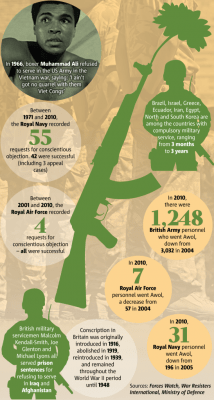The price of pacifism: Refusing to go to war is finally being recognised as a brave act
Independent
From the Second World War refusenik to the 19-year-old Israeli, Holly Williams talks to five people who risked shame and suffering to take a stand as conscientious objector.
From the Second World War refusenik to the 19-year-old Israeli, Holly Williams talks to five people who risked shame and suffering to take a stand as conscientious objector.
The conscientious objector is a popular trope in any drama touching on the First World War: Downton Abbey, Upstairs Downstairs and more recently The Village have been awash with young men persecuted for their moral stance, the white feathers they were shamed with fluttering about TV screens as if war was a pillow fight.
As we approach the centenary of the First World War next year, we’ll no doubt hear a lot more about those that fought – and those that felt an equally powerful compulsion not to. But conscientious objection did not begin and end there: conflicts since, including the Second World War and the Vietnam war, have involved conscription, while countries as diverse as Finland, Israel, South Korea, Greece, Columbia and Turkey still require their young people to perform military service.
Getting an exemption on conscientious grounds is, even today, often an arduous process, potentially prompting the century-old accusations of cowardice. COs may face jail sentences or fines, despite a 2012 UN document stating that “conscientious objection … is based on the right to freedom of thought, conscience and religion, set out in the Universal Declaration of Human Rights”.
International Conscientious Objection Day took place this week, on 15 May, and in the UK, a ceremony was held at the CO Commemorative Stone in Tavistock Square, Bloomsbury. Tomorrow, a small event will be held in the Peace Garden in Birmingham. The UK has also recently seen the opening of a new memorial to COs, at The National Memorial Arboretum in Staffordshire. Last month, the Quakers erected a new circular limestone structure there to commemorate, specifically, the Friends Ambulance Unit – a Quaker-run body open to all COs – and the Friends Relief Service, which aims to relieve civilian distress in Britain.
The earliest recorded incidence of conscientious objection was in 296AD, when a Roman refused to serve as a soldier because of his religious beliefs; he was killed, but subsequently canonised as Saint Maximilian. The term ‘conscientious objector’, however, only gained currency during the First World War, following the implementation of conscription in 1916. In Britain, over 16,000 men refused to fight. While it is well known that many with strong religious beliefs objected, interestingly some war-resisters refused on socialist grounds: they would not fight brother workers, feeling that the average soldier was but a pawn of the ruling classes.
Conscription laws allowed people to come before local tribunals – although few were given total exemption. Many were forced to join the army or the Non-Combatant Corps (NCC), to serve in a supporting role to the armed forces. Many ‘conchies’ refused either option, and were sent to prison as a result.
The abuses they suffered for their stance make for extremely grim reading. The Richmond Sixteen were a group of COs sent to Richmond Castle, an NCC base, and from there were sent to war camps in France in May 1916; when all but one of the men refused to move supplies, they were court-martialled and sentenced to death by firing squad, under the order of Lord Kitchener. Prime Minister Asquith intervened and they were sentenced to 10 years hard labour instead, breaking rocks in a Scottish quarry in appalling conditions; one man died of pneumonia, and all felt betrayed when they discovered the granite was, in fact, being used to build military roads. Two members went on the run; the rest went to prison, where they were frequently abused by guards. One man later committed suicide; several more suffered malnutrition and depression.
Ernest England, called up in 1917, suffered hugely for his pacifist beliefs. He was sentenced to two years hard labour in Wormwood Scrubs; when taken ill, he was refused a chamber pot, defecated on the floor – whereupon a guard buried his face in his own excrement. He was later transferred to Dartmoor and put on duty shovelling snow, on a diet of one slice of bread a day. He was still working, three months after Armistice, and died in March 1919. His story is told by David Boulton, in his book Objection Overruled, which adds that at least a hundred people went through similarly harrowing treatment.
But word got out about such experiences – and public feeling did move towards respect. It became recognised that to stand up and be counted as someone who would not fight required its own, very high, degree of courage.
While COs have rarely been subjected to such institutionalised brutality since, the decision not to fight has still frequently been problematic. We speak to five COs – from the Second World War and Vietnam through to contemporary Israel, and even a British soldier who had a change of conviction – about what led them to refuse military service, how they were treated as a result, and what impact their decision had, and continues to have, on their lives.
See more: conscientious objection,
Bringing it up to date: 100 years on from the First World War
This article, summarising ForcesWatch work, was first published on the White Feather Diaries website.
How soldiers deal with the job of killing
"We talk about destroying, engaging, dropping, bagging - you don't hear the word killing”. This article explores the effect of killing on people in the military, how many are unable to kill and others live with the effects of having killed for the rest of their lives. Also see The Kill Factor radio broadcasts.







